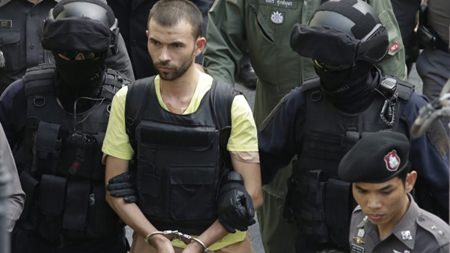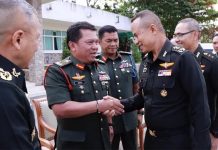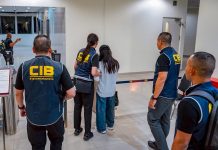Bangkok (AP) – The lawyer for one of two suspects in last year’s deadly bombing of a Bangkok landmark said Monday his client was tortured to elicit a confession, as the pair were set to formally hear the charges against them in a military court.
Lawyer Chuchart Kanpai says Bilal Mohammad avows he was tortured by security personnel into falsely confessing to the Aug. 17 blast at the Erawan Shrine that killed 20 people, 14 of them foreign tourists. More than 120 other people were hurt in one of the deadliest acts of violence in Bangkok in decades.
 Bilal Mohammad, initially identified as Adem Karadag, suspect in the Bangkok bombing. (Photo: AP)
Bilal Mohammad, initially identified as Adem Karadag, suspect in the Bangkok bombing. (Photo: AP)
Chuchart said that his client would deny all charges brought before the court Tuesday except that of illegal entry into Thailand.
Bilal and Mieraili Yusufu, described by officials as ethnic Uighurs from western China’s Xinjiang region, were indicted last November on 10 charges, including conspiracy to explode bombs and commit premeditated murder. No progress has been announced on the hunt for 15 other suspects sought in arrest warrants.
Police say the case against the two suspects is supported by closed-circuit television footage, witnesses, DNA matching and physical evidence, in addition to their confessions. Police believe Yusufu detonated the bomb minutes after a backpack containing the device was left at the shrine by a yellow-shirted man they suspect was Bilal.
Thai authorities say the bombing was revenge by a people-smuggling gang whose activities were disrupted by a crackdown. However, some analysts suspected it might have been the work of Uighur separatists who were angry that Thailand in July forcibly repatriated more than 100 Uighurs to China, where they may be persecuted. The Erawan Shrine is popular among Chinese tourists, and many were among the bombing victims.
Bilal was initially identified as Adem Karadag, the name on a fake Turkish passport he had when he was arrested Aug. 29.
“He was tortured by officials, he didn’t know if they were soldiers or police because they were non-uniformed,” said Bilal’s lawyer Chuchart. “Back then he confessed so that he wouldn’t be tortured again. He was just saying it.”
Yusufu, whose intentions for his court appearance are not known, was arrested Sept. 1 near the Thai-Cambodia border, carrying a Chinese passport indicating he was from Xinjiang.
Military courts have handled criminal cases deemed to involve national security since the May 2014 coup.




